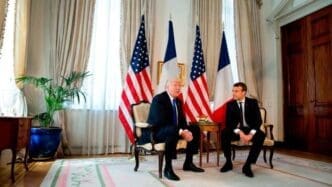In a surprising move, French President Emmanuel Macron is extending a significant gesture to Donald Trump by inviting him to a major event in Paris, signaling a shift in international political dynamics.
French President Emmanuel Macron’s decision to invite Donald Trump to the reopening of the Notre Dame Cathedral in Paris is more than just a ceremonial gesture. It underscores a pivotal moment as power dynamics appear to shift on the global stage with Trump preparing to enter his second term as U.S. President.
The invitation places Trump at the heart of a highly anticipated event, highlighting the changing tides of influence as he prepares to return to international politics. Notably, this move suggests that foreign leaders, including Macron, are positioning themselves to engage with the incoming administration, potentially altering alliances and diplomatic strategies.
Meanwhile, Trump’s assertive approach to foreign policy is already evident. He has threatened a trade conflict with Canada and Mexico, and his recent rhetoric towards Hamas indicates a hardline stance that foreign leaders must navigate. Macron’s overture seems to signal a strategic alignment with Trump, bringing him back into the international fold.
The contrast with Joe Biden’s current position is stark. Biden, criticized for his decision to pardon his son, finds himself facing declining influence both domestically and internationally. His trip to Angola, focusing on strategic U.S. interests in Africa, pales in comparison to Trump’s anticipated high-profile presence in Paris.
Macron’s attempt to charm Trump at this juncture presents a diplomatic challenge for European leaders grappling with Trump’s unpredictable political style. The impending visit raises questions about how global powers will manage their relationships with a U.S. president known for his volatile nature.
Trump’s prior relationship with Macron was marked by both camaraderie and tension, often reflecting larger geopolitical challenges. Their past interactions reveal a complex dynamic, suggesting that while the current invitation is significant, it does not guarantee long-term alignment between the two leaders.
Macron’s invitation also takes place against a backdrop of European political shifts, as leaders like German Chancellor Olaf Scholz face their own domestic challenges. Macron’s gesture may be seen as a bid to maintain France’s prominence within European politics, particularly as Germany’s political landscape becomes increasingly unstable.
The invitation to Trump may also be viewed through the lens of Macron’s internal political pressures. With growing populist movements in France, exemplified by figures like Marine Le Pen, Macron’s strategy could be an attempt to fortify his position domestically by engaging with Trump’s brand of nationalism.
As Donald Trump prepares to take the international stage once more, Emmanuel Macron’s invitation to Paris signifies a notable pivot in diplomatic relations. This development may have far-reaching implications for global politics, reflecting the complexities of engaging with a leader whose approach epitomizes unpredictability.
Source: CNN








